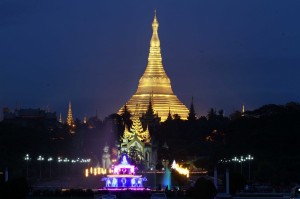Asian bourses vie for foothold in Myanmar

YANGON—Two of Asia’s biggest stock exchanges are fighting for dominance in the world’s hottest new frontier market as investors beat a path to Myanmar following the end of decades of military rule.
The operator of the Tokyo Stock Exchange announced last month a deal with Myanmar’s central bank to open a stock market in the country formerly known as Burma along with Japan’s Daiwa Securities, after years of discussions.
Executives from Asia’s largest bourse plan to travel to Myanmar later this month to ink the agreement.
But they face competition from South Korea, whose exchange also aims to open a stock market in the former pariah state, according to a spokesman for Korea Exchange in Seoul.
Its director recently visited the capital Naypyidaw for talks with Myanmar’s central bank governor about developing the country’s capital markets. But experts say the Japanese are unlikely to let the opportunity slip away.
“The Japanese need it more and they’ll be very, very competitive about getting into that market,” Tony Nash, a managing director for IHS Consulting in Singapore, told AFP.
He said there was a sense that the Tokyo Stock Exchange felt left out of recent consolidation between global market operators and needed “a growth enhancer to make them a little more attractive in terms of an exchange tie-up.”
The Japanese consortium has stolen a march on the Koreans, thanks to a little known but 16-year-old stock market tucked away in a crumbling building in downtown Yangon offering over-the-counter deals in two stocks.
The Myanmar Securities Exchange Center, a joint venture between Daiwa’s research arm and the government-run Myanma Economic Bank, has a skeleton staff of about 10 and just a few customers visiting every day.
But it is a market minnow with big ambitions, aiming to transform itself into a full-fledged bourse by 2015 using the technology and trading platforms of the Tokyo Stock Exchange.
Its low turnover is not due to a lack of interest. The two stocks listed – a bank and a timber company, both majority-owned by the government – offered attractive dividend yields of about 25-30 percent last year.
“Share trading is very tiny – there are so many buyers but no sellers,” Myanmar Securities Exchange Center managing director Shigeto Inami said in an interview at the bourse’s offices, where a small board displays the day’s prices of the two stocks printed on sheets of paper the old-fashioned way.
As well as interest among Burmese, foreign investors are eager not to be left out of what could be Asia’s next big economic boom, as the European Union and other countries start to roll back sanctions.
But investing in a country whose economy has been left in tatters by nearly half a century of military rule is not without risks.
“Due to its location, population and resources Myanmar is the holy grail for frontier investors, but it is still early in its reform process,” said Douglas Clayton, founder and CEO of Cambodia-based Leopard Capital, which specializes in emerging markets and plans to launch a Myanmar fund.
“There are severe capacity constraints in human resources and physical infrastructure. Myanmar is simply not ready to absorb the tidal wave of projects foreigners can imagine starting there,” he said.
Much of Myanmar’s industry is currently controlled by companies owned by the government or their cronies, although the government’s economic reforms could lead to increased competition from new rivals.
But the real goldmine – abundant oil, gas and other natural resources – are largely dominated by foreign companies, with the exception of logging. Most of these companies are unlikely to be listed on the local stock market.
Even those that are listed may not be willing to sell their shares to overseas investors for now.
While there is no law against foreigners holding Myanmar stocks, taking even a small stake means the company has to change its status to a foreign company, leading to restrictions in areas such as land ownership, said Inami.
His message for prospective foreign investors?
“I recommend them to marry a Myanmar lady and to buy in the name of the wife,” he said with a smile.
Such drastic measures may not be necessary for long, however, as the new quasi-civilian government seeks to overhaul its antiquated laws introduced during decades of rule by a repressive junta.
A new investment law, expected to be enacted later in the fiscal year, could pave the way for more companies to list their stocks on the Myanmar Securities Exchange, said Inami.
“There are so many good companies here in Myanmar but they are waiting for the new companies act and securities exchange law,” he added.
Yet, while investors salivate over one of Asia’s last frontier markets, experts warn that nerves of steel may be needed.
“Myanmar is an incredible long-term opportunity but patience and hard work will be required. You can’t modernize a substantial nation overnight,” said Clayton.